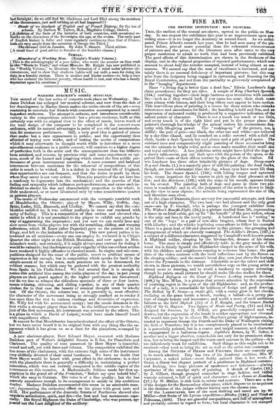MUSIC.
MADAME DUXES EN'S SOIREE MUSICALE.
Tan second of the last series of c,oncerts took place on Wednesday. Ma- dame Dulcken has enlarged her-musical scheme, and now from the dais of her drs.wingroom in Harley. Street.makes the entitle circuit of the art—even venturing to entertain: her friends with concertos accoonipanieoi by a small butoelect orchestra. The attempt is arduous, and introduces censiderable variety in the compositions selected: but a private residence, built as this certainly was with no original view to the effect of music, leaves much of the total design of the composer to be completed in the concert-room orchestra, will its natural advantages in point of sonsrite and -accommoda- tion for numerous performers. Stall, a very good idea is gained of pieces that make but a rare appearance in public; and the opportunity thus afforded of trying new works, and -of testing the merits of compositions which it may afterwards be thought worth while to introduce to a more miscellaneous audience in a public concert, will conduce to a higher degree of-perfection both in the artist and the accompaniment than has hitherto been attained, and remove, by previous trial and some experiment on opi- nion, much of the hazard and nusgiving which attend the .first public per- formance of great instrumental novelties. Atmore constant and habitual intercourse between musicians for the -rehearsal of compositions of this order is much to be wished. It is aslefect in the musical life- of England, that-opportunities are not frequent, and that the desire to profit by them When they occur is not very ardent. Thus, the practice of the art here has a tendency to degenerate into the mechanical; and the exercise of that feeliug and sympathy which influence part-performance, and cause each in- dividual. to render his due and characteristic proportion to the whole, is little understood, or at most illustrated only by some conscientious quartet er quintet players.
The music of Wednesday commenced with the energetic youthful work of Mendelssohn, the Ottetto; played by Messrs. Willy, Gothic, Jay, Betts, Loder, Hill, Hancock, and Lindley. We cannot say that the com- bination satisfied us; it was neither perfectly in tune nor rendered with unity of feeling. This is a eorepoeition of that serious and elevated cha- racter in -which it is not-permitted to the player to exhibit any pranks by way of aggravating the expression; and yet now we can rarely dear any slow notes from violin-players but with the trembling, sliding, anal weeping infieetions, whieh M. Ernst (after Paganini) gave us the pattern of in his Elegy, and left to the imitation of the town. This new, patent pathos is in- troduced on all occasions--event' one can employ it; we heard it in Chipp's Quartet the other night at the British Musicians, and now again in Men- delsseho's work: and certainly, if it might always pass current for feeling it would be valuable ; but thefrequoncy,and vulgarity of this too evident artifice have rendered it highly offensive in classictilmusic. In elegies and solo oom- positions designed for the mass of the public, resort to artificial means of expression is fair enough; but in composition which speaks for itself in the simple accent of its own notes, such practices are to be denounced, for evident reasons, but which may be gathered with the greatest authority from Spoln- in his Violin School. We feel assured that it is enough to notice this artificial bias among the violin-players of the day, te put young players on their guard against it; the higher performers are fore-armed: nor do we fear to witness the ridiculous spectacle of-three or four instru- ments whining, shivering, and sliding together, in any of their quartet circles; for in- that case the beauty of musical thought must be wholly lost. Of the Ottetto, the scherzo was, as it generally is, most effective; the character of the movement being so strongly marked as to render it less open than the rest to various. readings and diversities of expression. Mr. Willy led with his accustomed energy; but the music demandsin the first violin a stronger player than he is. In the brilliant return to the sub- ject te the first movement, his instrmnent was covered by the others. This is a place in which a David of Leipsic; would have made himself heard with magnificent effect.
It cannot be that Mendelssohn has miscalculated the effect of the-Ottetto, but we have never heard it in its original form with any thing Illse the en- joyment which it has given us as a duet for the pianoforte, arranged by himself.
A new. clarionet-player, Herr Eduard Meyer' executed with Madame Dulcken part of Weber's delightful Sonata M E flat, for Pianoforte and Clarionet The quality of tone possessed by Herr Meyer is beautiful; round and soft, yet with force and volume. The composition exhibited the fine tones of the -chalumeau, with the extreme high notes of the instrument very skilfully divested of their usual harshness. We have no doubt that lien Meyer would be heard with great effect in the orchestra: in .a duet with the pianoforte there is generally a difficulty in maintaining a perfect intonation, which was not entirely conquered in the middle region of the instrument on this occasion. A Mademoiselle Schloss made her first ap- pearance in the grand air of the Frei:chute, "Before my eyes beheld him" • which she sang in German. Her voice is of a fine quality; but she hat: scarcely experience enough in its management to satisfy in this ambitious display. Madame Dulcken accompanied this sane in an admirable man- ner; _representing the orchestral effect on the piano with great taste and skill- Her performance of the dramatic Sonata of Beethoven showed also exquisite articulation, spirit, and fire—the first and last movements espe- cially. His Royal Highness the Duke of Cambridge, who was present, aps Peered not the least delighted of the auditory.


























 Previous page
Previous page